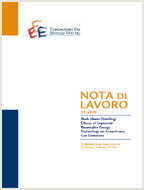Imperfections in the Economics of Public Policy, Imperfections in Markets, and Climate Change

19.11.2009
Nicholas Stern
H
Public Policy, Climate Change
Climate Change and Sustainable Development
Carlo Carraro
In the last twenty years economics has created much of lasting value and real potential: it has been a very fertile period. But economics has also suffered from what I shall term "collective amnesia" covering whole areas of public policy. And on policy and the role of government it has, embarrassingly in my view, swayed with the political winds to the detriment of both our profession and to outcomes. Both the amnesia and the political bending have contributed to the economic crisis of the last year or two and to hostility towards the profession. My purpose here is first to lament the amnesia on theories of public policy in imperfect economies, in short the subject of public economics, to describe the bending of public policy analysis to political vogue, and to indicate some of the consequences. I then describe some of the mechanics of the processes described, in terms of choice of models and patterns of teaching. Finally, I use the example of climate change to illustrate some of the consequences of the amnesia, as well as of the political influence.
